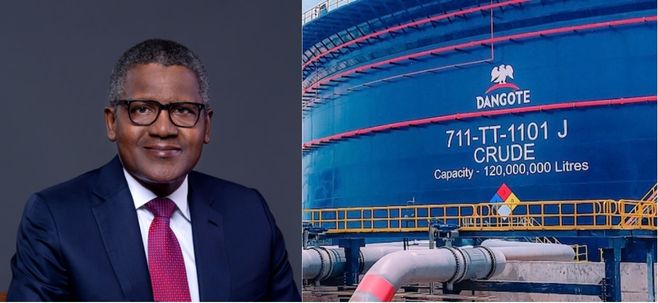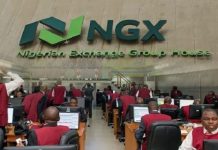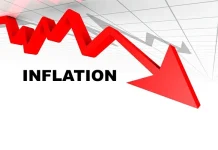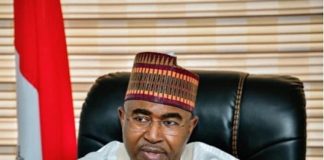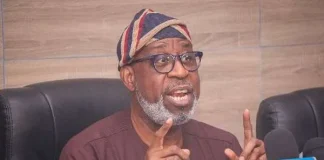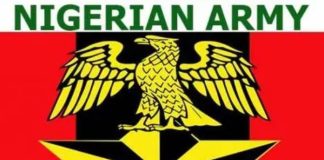🌿 Ruzu Non-Alcoholic Herbal Bitters
Ruzu Non-Alcoholic Herbal Bitters is a natural health supplement specially formulated to:
- ✅ Promote general wellness
- ✅ Detoxify the body
- ✅ Support the treatment of various ailments
Made from a powerful blend of 100% organic and medicinal herbs, Ruzu is completely alcohol-free, making it ideal for:
- 👪 All age groups
- 🌱 Health-conscious individuals
- 🌿 Anyone seeking non-alcoholic herbal remedies
Whether you're looking to boost your vitality, cleanse your system, or support healing the natural way, Ruzu Bitters offers a trusted herbal solution.
Aliko Dangote, the president and richest man in Africa, of Dangote Industries Limited (DIL), has announced ambitions to increase Nigeria’s export capacity with a bold project that focuses on fertilizer shipments that may generate up to $7 million per day.
While visiting the Nigerian Ports Authority (NPA) headquarters in Lagos, Dangote described his export plan as a business endeavor that has never been done before in Nigeria.
“We will be exporting approximately 16,000 tons of fertilizer over the next two years,” he stated. It is estimated that the country will get between $6.5 million and $7 million in revenue every day. There will be around eight cargoes of fertilizer exported by us.
At a capacity of 3 million metric tons per year, the Dangote Fertilizer factory is Africa’s largest granulated urea producing complex. By reducing reliance on foreign agricultural inputs, this facility has been crucial in supporting Nigeria’s farming sector.
The business magnate has far more in mind than just shipping fertilizer. In his Sunday meeting with NPA director Abubakar Dantsoho, he presented detailed plans to increase exports of a variety of products, such as cement, coal, polypropylene, and several petroleum commodities.
“We are about to significantly grow our export business. As many of you who visited our cement factory in Itori may already be aware, we already export cement from Nigeria. His company will start exporting coal in a few weeks, he revealed, adding, “We have a whole factory of six million tons for cement export.”
Read Also: Investors Pump N583bn Into Nigerian Exchange, Market Reaches New Peak
More than 25 million tons of a variety of goods will be exported from the enormous $20 billion petroleum refinery, which is presently functioning. These cargoes will include, among other things, up to 700,000 metric tons of polypropylene.
Dangote described in detail the incredible scope of the planned maritime operations in the Lekki zone. About 240 crude oil ships are expected to be involved in the activities annually, with each vessel carrying one million barrels of crude oil. Furthermore, the operations will need a large number of fertilizer transport ships and more than 600 product carriers.
He claimed that this operation had never before been observed in the nation. But without the assistance we require from NPA, our activities will collapse.
Improved government support for the ports authority’s expansion plans is crucial for its implementation, the businessman emphasized. The necessity for more maritime resources and equipment was emphasized by him.
“With their own hands, the [NPA] will not be able to accomplish these tasks. They are in need of equipment. He pointed out, “They need more tugboats.”
For the authority to acquire sufficient government support, Dangote is dedicated to promoting institutional aid.
“In the appropriate quarters, we will also be putting in a few words to ensure that NPA receives all the assistance that it needs from the Federal Government,” he continued.
NPA Director Dantsoho stated that the authority is dedicated to meeting the growing maritime needs of the Dangote Group, acknowledging their significance for the growth of Nigeria’s marine and blue economy industries.
The current port activity has already exceeded the 600 vessels per year that Dangote had estimated. Beyond original projections, the authority has processed and managed more than 57 vessels every month beginning October 1, 2024.
That is greater than the first projection. Nigerian ports’ operations will undoubtedly quadruple over the next year or two, Dantsoho said.
During the third quarter, Tin-Can and Apapa port infrastructure upgrades are expected to start, while additional deep-water port developments in Ibom, Bakassi, Olokola, Ondo, and Badagry locations have been authorized.
“The government has concerns about these new ports.” We’re going to start seeing these ports become a reality very soon,” he remarked.
A significant change in Nigeria’s trade profile, this extensive export growth could establish the nation as a significant exporter in a number of industrial areas. Fertilizer, cement, petroleum products, and other commodities might be combined to greatly increase foreign exchange profits and fortify Nigeria’s place in international markets.
The expansion of government infrastructure, especially port facilities and maritime support services, would require concerted efforts from the private sector and the government.

